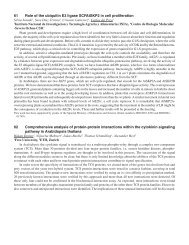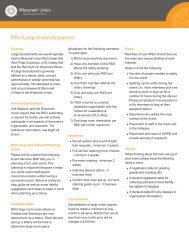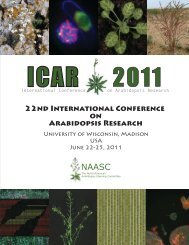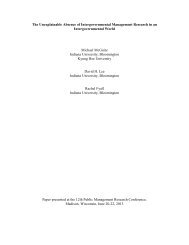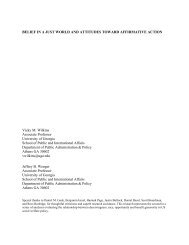PROGRAM & ABSTRACTS - Wisconsin Union - University of ...
PROGRAM & ABSTRACTS - Wisconsin Union - University of ...
PROGRAM & ABSTRACTS - Wisconsin Union - University of ...
You also want an ePaper? Increase the reach of your titles
YUMPU automatically turns print PDFs into web optimized ePapers that Google loves.
Aging, Metabolism, Stress, Pathogenesis, and Small RNAs in C. elegans Topic Meeting 2012<br />
Germline Stem Cells Regulate Somatic Proteostasis During<br />
Caenorhabditis elegans Adulthood<br />
Netta Shemesh, Nadav Shai, Anat Ben-Zvi<br />
Ben-Gurion <strong>University</strong> <strong>of</strong> the Negev, Beer-Sheva, Israel<br />
All cells rely on highly conserved protein folding and clearance pathways to detect<br />
and resolve protein damage and maintain protein folding homeostasis (proteostasis). The<br />
recognition that an age-associated imbalance in proteostasis is a potent contributor to the<br />
onset <strong>of</strong> neurodegenerative diseases stresses the need to understand how protein folding is<br />
regulated in a multi-cellular organism. We have noted that the ability <strong>of</strong> Caenorhabditis elegans<br />
to maintain proteostasis declines sharply following the onset <strong>of</strong> oocyte biomass production,<br />
suggesting that a restricted folding capacity may be linked to the onset <strong>of</strong> reproduction. To<br />
test this hypothesis, we monitored the effects <strong>of</strong> different sterile mutations on proteostasis<br />
maintenance in the soma <strong>of</strong> C. elegans. We find that germline stem cell (GSC) arrest rescued<br />
protein quality control, resulting in maintenance <strong>of</strong> robust proteostasis in different somatic<br />
tissues <strong>of</strong> adult animals. We further demonstrate that cell-nonautonomous signaling via kri-1,<br />
a key player in GSC-dependent regulation <strong>of</strong> fat metabolism and longevity, is a mediator <strong>of</strong><br />
proteostasis maintenance in adulthood. We find that signaling through kri-1 and, specifically, the<br />
activity <strong>of</strong> LIPL-4, a lipase that is regulated by KRI-1, can uncouple germline proliferation from<br />
somatic proteostasis and prevent the switch between a robust and a limited state <strong>of</strong> proteostatic<br />
capacity in the soma. This decreases the age-dependent accumulation <strong>of</strong> damaged proteins<br />
and postpones the onset <strong>of</strong> age-dependent protein misfolding in a polyglutamine disease model.<br />
Contact: anatbz@bgu.ac.il<br />
Lab: Ben-Zvi<br />
4<br />
Session 1



